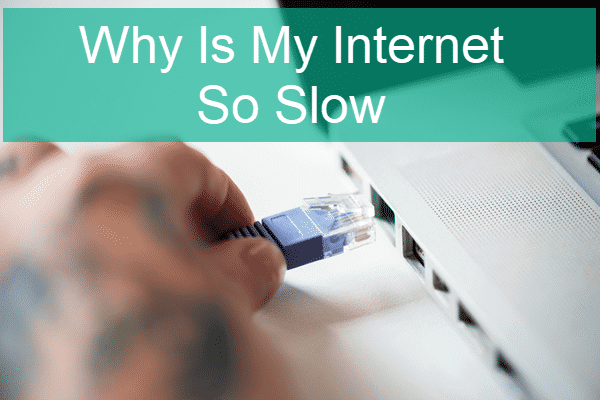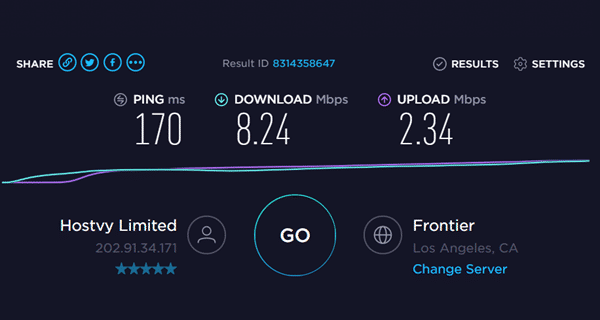Why Is My Internet/WiFi So Slow All of A Sudden Today – How to Fix It
More often than not, when your computer is running slowly to load a website, it has nothing to do with the CPU or RAM, but with your Internet instead. In this article, we are going to introduce an assortment of causes to the slow Internet speed and tips to fix it.

There are numerous reasons your Internet connection may seem slow. It could be an issue with your modem or switch, Wi-Fi signal, signal quality on your cable line, gadgets on your system immersing your transfer speed, or even a moderate DNS server. The points in this article may help you find out “why is my WiFi so slow” and how to speed up slow Internet.
Troubleshoot the Problem With Multiple Websites and Devices
On the off chance that your speed test affirms your web is moderate, you should have a go at associating with different sites and utilizing numerous gadgets in your home. If the gradualness is simply with one site, it’s presumably that site’s concern—not your internet’s. There’s not much you can do about this aside from sitting tight for the general population responsible for the site to fix it.
Narrowing down where the issue untruths will enable you to fix it. Does the gradualness simply occur on one PC or every one of your gadgets? For the former, you just need to reboot the PC, or you may need to play out a malware filter with your favored antivirus to watch that all is well. For the latter, however, it’s very likely a network system issue, and you’ll need to go to your switch.
Bonus tip: Data loss is also a significant concern for many people. Don’t hesitate to use the best data recovery software if you need to recover lost files from SD card, hard drive or computer.
Check Internet Speed and Compare It to Your Plan
Before experiencing a cluster of investigating on your end, it merits running a speed test utilizing a site like Speedtest.net to perceive how well it’s really performing. Make sure to stop any downloads, transfers, Netflix gushing, or other substantial web action before running the test to guarantee as meager obstruction with the outcomes as would be prudent.

Look at the deliberate speed results against the normal speed of the Internet connection you’re paying for. In case you don’t have a clue about this current, there’s a decent shot you can discover it on the bill for your Internet connection or your Internet service provider’s site. There are a few provisos here. Speed tests may once in a while show up somewhat high, as some Internet service providers may organize them and they may have servers extremely near you.
Rates may likewise be slower at busier occasions of the day, when everybody in your neighborhood is utilizing the Internet connection, than at off hours when numerous individuals are resting or at work. Obviously, it could likewise simply be that you pay for an exceptionally moderate web plan—in which case you’ll have to call your web supplier and pay more to overhaul your administration! Be that as it may, in case you’re paying for specific connection speed and reliably get speed test results that are well underneath that, it’s a great opportunity to move to the investigating ventures beneath.
Reboot Your Modem and Router
Like PCs, modems and switches now and again stall out in a terrible, moderate, over-burden state. This issue can be fixed with a reboot. On the off chance that you haven’t rebooted your switch and modem in some time, you ought to do it now.
If you have a consolidated modem/switch unit, you may have the one gadget to reboot. In any case, there’s a decent possibility you have to reboot two bits of equipment: The switch and the modem. The switch interfaces with the modem, which is associated with the link leaving the divider. To reboot them, unplug each from their separate electrical plugs for ten seconds before connecting them back. It might take a couple of minutes for your modem to reconnect to the Internet and bring your Internet connection on the web, so be understanding. Check if your speed improves after the reboots.
Improve Your Wi-Fi Signal
It’s conceivable that your web is normal but the Wi-Fi—which interfaces you to the web—is having signal issues. A terrible Wi-Fi connection can appear to be an Internet issue, particularly since it can influence every one of the gadgets in your home. There are many reasons you may have a terrible Wi-Fi signal. This is an especially regular issue in denser urban territories—for instance when you live in a high rise with neighbors who have a bundle of remote switches and different gadgets.
You could have a no man’s land, something meddling with your Wi-Fi signal or poor inclusion all through your home. Counsel our manual for accelerating your Wi-Fi and showing signs of improvement motion for more tips. If you have a bigger home or yard and need better Wi-FI inclusion, consider getting a work Wi-Fi framework that gives numerous base stations you can put around your home or property.
Quit Saturating Your Connection (or Try QoS)
Your Internet connection is shared by every one of the gadgets in your home, so different devices on your system could be soaking your network, backing things off for every other person.
For instance, if two individuals are using Netflix and one individual is endeavoring to download a document with BitTorrent, everybody’s experience will back off. Stop (or back off) a portion of those different downloads to speed things up.
If it is a regular need for your family or office, you may need to upgrade your internet service. Be that as it may, you can likewise check whether your switch has a Quality of Service (QoS) include, which will enable your switch to consequently oversee and allocate how much data transfer capacity various gadgets and administrations get. For example, it can naturally throttle BitTorrent transmission capacity to abstain from backing off Netflix streams.
Check for Coax Splitters
If you have coaxial link splitters on hold heading off to your cable modem, these could be debasing your signal quality and prompting slower Internet connection. Splitters differ in quality, and an awful, shabby one could bring down your signal quality substantially more than a higher quality one would. An extensive number of splitters could cause an issue, as well.
If you do have splitters on your link line, take a stab at detaching them to investigate your Internet connection. Check how your Internet connection performs with no splitters at stake. If you get quicker Internet connection speed, you’ve discovered your concern.
Try a Different DNS Server
Now and again, exchanging DNS servers can help accelerate your visible connection speed if your default Internet service provider DNS servers are moderate. Here’s the manner by which DNS works: When you interface with a site like google.com, your PC contacts its DNS servers and asks “What numerical IP address is related with google.com?” It finds a solution back and associates with that IP address, which might be something like 216.58.193.78 and after that interfaces with that address.
Normally, your DNS server is assigned by your Internet service provider. In case they’re slow or over-burden, you might most likely improve speed by changing to another arrangement of DNS servers. Google Public DNS and OpenDNS are both well known. You can check the fastest DNS servers in 2019.
Call Your ISP and Report the Problem
If you’ve gone through all these methods and can’t fix the issue, it is possibly not a problem you can fix. It might be your Internet service provider’s concern. For instance, there might be an issue with the cable line running from your home to your ISP, or with some other gear they have. For this situation, you should call your Internet service provider and report the issue.
A Couple of Different Causes
Modem execution
- Sometimes your modem gets befuddled and needs some assistance. This is the most effortless and fastest fix is to control cycle your modem.
- Next, ensure your modem has the most recent firmware adaptation.
- Still having issues? Reset your modem to manufacturing plant defaults. On the off chance that you have custom settings in the modem that you need to keep, you can reinforce and reestablish your modem settings.
Content provider
Content providers, like YouTube, Netflix and Hulu, give a great deal of video to the world. This requires a lot of transmission capacity that they buy from their ISP for. In the event that the supplier is getting a greater number of solicitations than their transmission capacity can deal with, your video will cradle.
Instructions to Fix Slow Internet
We would prefer not to get excessively specialized. These tips are intended to be handy solutions:
- Restart your modem and switch: This convenient solution fathoms a ton of issues right away. If unusual lights are flickering, have a go at killing the switch and on once more, at that point counsel your hardware’s manual or the organization’s site if that doesn’t work.
- Remove remote impedance: If your Wi-Fi switch happens to live inside a fridge, you might need to get it out and far from any thick steel dividers or other conceivably meddling materials.
- Amplify your Wi-Fi signal: Make beyond any doubt the power is solid with your switch. Some Wi-Fi extenders cost about $20– $30 on Amazon.
- Hide Your Wi-Fi: Set a secret word to shield your web and your kin from your neighbors or any other individual hoping to get a free ride—they’re snatching your data transfer capacity.
- Upgrade your gear: If you purchased your hardware a couple of years back, feel free to treat yo’ self to another modem or switch on Amazon.
- Add-ons need to back off: The module that transforms each picture into an image of Gwen Stefani may be a lot for your program to deal with.
- Torrential storm: Torrenting can truly drain the life out of your download speeds, so spare it for evening time when everybody’s sleeping.
- Consider an advertisement blocker: Ad-blockers may counteract popup promotions, liveliness, and recordings, which could spare you valuable download time.
- Scan down: Running a framework or infection sweep can seriously restrain your PC’s execution, so spare it for when you’re not watching CeeLo offer his lovely scrutinizes.
- Erase your history: Browser treats can moderate your PC’s execution after some time, much like genuine treats and your body, so perhaps it’s an ideal opportunity to erase them.
You’re paying your Internet Service Provider to get a steady connection, and they must fix any issues with it on their end. Simply make sure it’s really their concern and not an issue on your end—like Wi-Fi signal issues.


